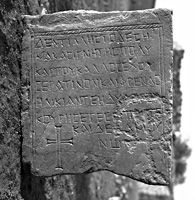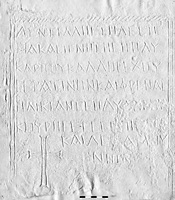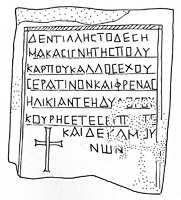 MAMA XI 278 (Northern Lykaonia)
MAMA XI 278 (Northern Lykaonia) 
Funerary inscription of Dentilla, in verse
- Type of monument:
- Funerary inscription in verse.
- Location:
- Zıvarık (Altınekin) (Northern Lykaonia): in a house; said to have been dug up nearby the previous day.
- Description:
- Coarse marble slab, broken below. Inscription within incised border, with incised guide-lines below each of lines 2-6. At lower left, an incised cross; at lower right, a cross under a ciborium (?), roughly chipped at a later date.
- Dimensions:
- Ht. 0.36+; W. 0.37; Th. 0.10; letters 0.013-0.021.
- Record:
- Squeeze; line drawing; MB notebook copy; photograph (1956/152).
- Publication:
- None.
- Date:
- Fourth or fifth century AD.
Δεντίλλης τόδε σῆ-
μα κασιγνήτης Πολυ-
κάρπου, | κάλλος ἔχου-
σ᾿ ἐρατινὸν καὶ φρένας
5ἡλικίαν τε | ἡδυλόγου
κούρης ἔτεσε̣ι̣ π[έν]τε
† καὶ δέκα μού-
νων.
This is the tomb of Dentilla, sister of Polykarpos, who possessed lovely beauty and intelligence, and the youthful age of a sweet-voiced maiden; she was only fifteen years old.






The inscription forms three hexameter verses of reasonable accuracy. For the adjective ἡδυλόγος, compare MAMA XI 335 (1956/165, Koçaş: ἡδυεπής); for the combination of beauty and youth (κάλλος... ἡλικίαν τε), cf. MAMA XI 218 (1954/33: Aşağı Küçük Hasan). The name Dentilla is extremely rare: cf. IGUR III 1152.
It is not impossible that Dentilla was the sister of the Polykarpos of MAMA XI 335. One could believe that the same poet wrote both epigrams; note the unmetrical statements of the deceased’s age in both epigrams (here, ἔτεσει πέντε καὶ δέκα μούνων; MAMA XI 335, ἔτεσ᾿ εἴκοσι μούνων), both of which have a dative plural agreeing with a genitive plural.